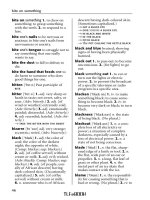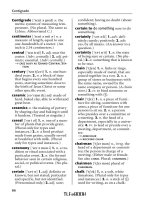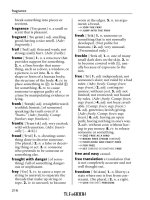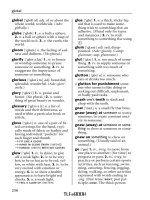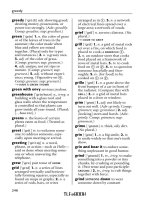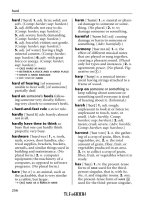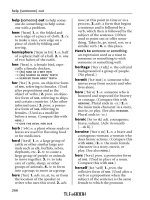NTC''''s Pocket Dictionary of Words and Phrases part 38 potx
Bạn đang xem bản rút gọn của tài liệu. Xem và tải ngay bản đầy đủ của tài liệu tại đây (257.38 KB, 10 trang )
matically in the computer’s mem-
ory.)
log out Go to log off.
logic ["ladZ Ik] 1. n. the science of
reasoning; the part of philosophy
that deals with reason. (No plu-
ral.)
2. n. a method of argument
or reasoning. (No plural.)
3. n.
sense; rational thought; the ability
to reason. (No plural.)
logical ["ladZ I k@l] adj. making
sense; according to the rules of
logic. (Adv: logically [
Ik li].)
lollipop ["lal i pap] n. a piece of
hard candy on the end of a stick.
lone ["lon] adj. only; alone; without
others. (Prenominal only. See
also
alone. No comparative or
superlative.)
lonely ["lon li] 1. adj. sad because
one is alone; lonesome. (Comp:
lonelier; sup: loneliest.)
2. adj. iso-
lated; away from other people.
(Comp: lonelier; sup: loneliest.)
lonesome ["lon s@m] adj. lonely;
sad because one is alone. (Adv:
lonesomely.)
long ["lON] 1. adj. great in length or
in amount of time. (Comp: longer;
sup: longest.)
2. adj. having a cer-
tain length; lasting a certain
amount of time. (Follows the
measure of length or time. Comp:
longer.)
3. adv. for a great extent of
time before or after the time indi-
cated.
4. adj. seeming to take more
time than normal; seeming to be
farther than normal. (Comp:
longer; sup: longest.)
→
all day long
→ all month long
→ all night long
→ all summer long
→ all year long
→ as long as
→ in the long run
→ make a long story short
→ not long for this world
→ over the long haul
→ so long as
long ago long before this time;
much earlier than now.
long distance ["lON "dIs t@ns] 1. n.
telephone service between points
that are far apart. (No plural.)
2. adj. covering a great distance;
linking people or things that are
far apart. (Hyphenated.)
3. adv. in
a way that covers a great distance;
not locally. (Hyphenated.)
Long time no see. a phrase indi-
cating that one has not seen some-
one for a long time.
look ["lUk] 1. n. an act of seeing
[someone or something]; an act of
trying to see someone or some-
thing.
2. n. a manner or style of
appearing.
3. n. an expression on
the face.
4. iv. to seem; to appear
[to be].
5. iv. to face a certain
direction; to be positioned in a
certain direction.
→
faraway look
→ far-off look
→ have a look for
someone or
something
→ like looking for a needle in a
haystack
→ take a look for
someone or
something
look as if butter wouldn’t melt
in
one’s
mouth to appear to be
cold and unfeeling (despite any
information to the contrary).
look at
someone or something
to
move the eyes to see or examine
someone or something.
log out
336
05 7/23/03 8:49 AM Page 336
TLFeBOOK
look away (from
someone or
something
) to turn one’s gaze away
from someone.
look back (at
someone or some-
thing
) and look back (on
some-
one or something
) 1. to gaze back
and try to get a view of someone
or something.
2. to think about
someone or something in the past.
look back (on
someone or some-
thing
) Go to look back (at
someone
or something
).
look daggers at
someone
to give
someone a dirty or angry look.
look down (at
someone or some-
thing
) 1. to turn one’s gaze down-
ward at someone or something.
2. and look down on
someone
or something
to view someone or
something as lowly or unworthy.
look down on
someone or some-
thing
Go to look down (at
someone
or something
).
look good on paper to seems fine
in theory, but not perhaps in prac-
tice; to appear to be a good plan.
look in (on
someone or something
)
to check on someone or some-
thing.
look into
something
1. to gaze into
the inside of something.
2. to
investigate something.
look like a million dollars to
look very good.
look like the cat that swallowed
the canary
to appear as if one has
just had a great success.
look on to be a spectator.
look out to be careful; to think and
move fast because something dan-
gerous is about to harm one. (Usu-
ally a command.)
look out for
someone or something
1. to be watchful for the appear-
ance of someone or something.
2. to be alert to the danger posed
by someone or something.
3. to
protect or guard someone or
something.
look
someone or something
over to
examine someone or something.
look
someone or something
up
1. to seek someone, a group, or
something out.
2. to seek infor-
mation about someone or some-
thing in a book or listing.
look the other way to ignore
(something) on purpose. (Also
used literally.)
look through
something
1. to gaze
through something.
2. to examine
the parts, pages, samples, etc., of
something.
look up to show promise of
improving.
look up to
someone
to admire
someone.
look (up)on
someone or something
as
something
to view someone or
something as something; to con-
sider someone or something to be
something.
loom ["lum] 1. n. a machine used
for weaving cloth, blankets, or
rugs.
2. iv. to appear somewhere in
a threatening or unfriendly way.
loom large to be of great impor-
tance, especially when referring to
a possible problem, danger, or
threat.
loom large
337
05 7/23/03 8:49 AM Page 337
TLFeBOOK
loom out of
something
to appear
to come out of or penetrate some-
thing.
loom up to appear to rise up [from
somewhere]; to take form or defi-
nition, usually threateningly.
loop ["lup] n. anything that looks
like a circular figure formed by a
line that curves and possibly
crosses itself.
→
knock
someone
for a loop
→ throw
someone
for a loop
loose ["lus] 1. adj. not tight; having
room to move. (Adv: loosely.
Comp: looser; sup: loosest.)
2. adj.
free; escaped and not confined.
3. adj. not exact. (Figurative on
Q. Adv: loosely. Comp: looser; sup:
loosest.)
4. adj. [of morals] lax or
not restrained. (Adv: loosely.
Comp: looser; sup: loosest.)
5. adv.
freely.
→
at loose ends
→ break loose (from
someone
)
→ play fast and loose (with
someone
or something
)
loosen
someone or something
up
1. to make someone’s muscles and
joints move more freely by exercis-
ing them.
2. to make someone or a
group more relaxed and friendly.
loosen
something
up to make
something less tight.
loosen up to become loose or
relaxed.
loot ["lut] 1. n. stolen money or
objects. (No plural.)
2. tv. to rob
things or places, especially during
a war or a riot.
3. iv. to steal
[something], especially during a
war or riot.
lord it over
someone
to dominate
someone; to direct and control
someone.
lose ["luz] 1. tv., irreg. [for someone
or something] to “escape” from
one’s care, ownership, or posses-
sion. (Past tense and past partici-
ple:
lost.) 2. tv., irreg. to have less
of something after doing some-
thing or after something happens.
3. tv., irreg. not to win something;
not to gain or receive something.
4. iv., irreg. not to win; to be
defeated.
lose face to lose status; to become
less respectable.
lose heart to lose one’s courage or
confidence.
lose
one’s
grip to lose control over
something.
lose
one’s
temper to become
angry.
lose
one’s
train of thought to for-
get what one was talking or think-
ing about.
lose
oneself
in
something
to have
all one’s attention taken up by
something.
lose out to lose in competition; to
lose one’s expected reward.
lose out (on
something
) to miss
enjoying something; to miss par-
ticipating in something.
lose out to
someone or something
to lose in a competition to some-
one or something.
loss ["lOs] 1. n. an instance of losing
something.
2. n. the value of
something that was lost; how
much something lost costs; money
that is lost or never earned.
3. n.
loom out of something
338
05 7/23/03 8:49 AM Page 338
TLFeBOOK
the death of someone; the death of
a loved one.
4. n. a defeat; the fail-
ure to win.
→
cut
one’s
losses
lost ["lOst] 1. past tense and past
participle of
lose. 2. adj. unable to
be found.
3. adj. no longer owned;
no longer in one’s possession.
4. adj. not knowing where one is;
not knowing how to get to where
one wants to be.
→
make up for lost time
lost in thought busy thinking.
lost on
someone
having no effect
on someone; wasted on someone.
(Informal.)
lot ["lat] 1. n. a part of the available
goods; a group of goods.
2. n. fate;
destiny; the kind of life that one
has been granted.
3. n. an area of
land; a share of land; a piece of
property.
→
cover a lot of ground
→ draw lots
→ get a lot of mileage out of
something
→ have a lot going (for
one
)
→ job lot
→ parking lot
a lot 1. and lots n. many of the
people or things already men-
tioned; much of something
already mentioned. (Treated as
singular or plural, but not counta-
ble.)
2. adv. much; often.
a
lot of
someone or something
and
lots of
someone or something
many people or things; much of
someone or something.
lotion ["lo S@n] n. a creamy liquid
that is rubbed on the body to
soothe, add moisture, or clean the
skin. (Plural only for types and
instances.)
lots of
someone or something
Go to
a
lot of
someone or something
.
loud ["laUd] 1. adj. [of sound] hav-
ing much volume or intensity; not
quiet. (Adv: loudly. Comp: louder;
sup: loudest.)
2. adj. too bright;
showy. (Figurative on Q. Adv:
loudly. Comp: louder; sup: loud-
est.)
3. adv. sounding as in Q.
(Comp: louder; sup: loudest.)
lounge around (
someplace
) to lie
about someplace.
love ["l^v] 1. n. a strong emotion of
attraction, care, romance, or
desire toward someone. (No plu-
ral.)
2. n. a strong interest in
something. (No plural.)
3. n. [in
tennis] a score of zero.
4. tv. to
care deeply for someone romanti-
cally.
5. tv. to care deeply for
someone; to care very much about
someone.
6. tv. to care about or
like something very much.
→
fall in love (with
someone or
something
)
→ labor of love
love at first sight love established
when two people first see one
another.
love to
do something
to enjoy
something; to enjoy doing some-
thing; to have an interest in doing
something.
lovely ["l^v li] adj. beautiful; pretty;
attractive. (Comp: lovelier; sup:
loveliest.)
lovely weather for ducks rainy
weather.
lover ["l^v #] 1. n. one of two peo-
ple who love each other in a
romantic way.
2. n. someone
whom one loves in a romantic
way; a mate to whom one may or
lover
339
05 7/23/03 8:49 AM Page 339
TLFeBOOK
may not be married. 3. n. someone
who enjoys something; someone
who enjoys doing something.
low ["lo] 1. adj. only a little way
above the ground or sea level; not
high. (Comp: lower; sup: lowest.)
2. adj. near the bottom of some-
thing. (Comp: lower; sup: lowest.)
3. adj. less than average in
amount, power, volume, height,
intensity, cost, etc. (Comp: lower;
sup: lowest.)
4. adj. [feeling] weak
or unhappy. (Comp: lower; sup:
lowest.)
5. adj. mean; unkind;
cruel. (Comp: lower; sup: lowest.)
6. adj. [of a supply or of strength]
inadequate or not enough. (Comp:
lower; sup: lowest.)
7. adv. to or at
a position below or near the bot-
tom of something.
→
burn with a low blue flame
→ have a low boiling point
→ hunt high and low for
someone or
something
→ run low (on
something
)
→ search high and low for
someone
or something
lower ["lo #] 1. iv. [for something]
to go from a high level to a low
level.
2. tv. to cause something to
go from a high level to a low level;
to move something down.
lower
one’s
sights to set one’s
goals lower.
lower
one’s
voice to speak more
softly.
lower
oneself
to
some level
to
bring oneself down to some lower
level or behavior.
lower the boom on
someone
to
scold or punish someone severely;
to crack down on someone and
become very strict. (Originally
nautical.)
lowercase ["lo # "kes] adj. [of a
letter or letters] in the smaller size
as with i in Bill: not capitalized.
(Compare this with
uppercase.)
lowly ["lo li] adj. humble; low in
rank; simple; meek. (Comp:
lowlier; sup: lowliest.)
loyal ["loI @l] adj. true to one’s
friends, country, or promises.
(Adv: loyally.)
loyalty ["loI @l ti] n. the quality of
being loyal. (Plural only for types
and instances.)
lubrication [lu br@ "ke S@n] 1. n.
applying something that will make
things slippery; applying oil or
grease. (No plural.)
2. n. some-
thing like oil or grease that makes
things slippery. (Plural only for
types and instances.)
luck ["l^k] 1. n. random chance;
fortune; chance. (No plural.)
2. n.
good or bad fortune; success or
failure. (No plural.)
→
as luck would have it
→ out of luck
→ press
one’s
luck
→ push
one’s
luck
lucky ["l^k i] 1. adj. [of someone]
having good luck; fortunate.
(Comp: luckier; sup: luckiest.)
2. adj. causing good luck; bring-
ing good fortune. (Comp: luckier;
sup: luckiest.)
3. adj. showing,
having, or being good luck. (Adv:
luckily. Comp: luckier; sup:
luckiest.)
→
thank
one’s
lucky stars
lug ["l^g] 1. n. a small piece that
sticks out of something.
2. tv. to
carry or move someone or some-
thing heavy.
low
340
05 7/23/03 8:49 AM Page 340
TLFeBOOK
luggage ["l^g IdZ] n. baggage; suit-
cases. (No plural. Number is
expressed with piece(s) of luggage.)
lukewarm ["luk "worm] 1. adj.
slightly warm.
2. adj. without
excitement; without enthusiasm.
(Figurative on Q. Adv: luke-
warmly.)
lull ["l^l] n. a quiet moment
between long periods of noise or
activity; a temporary calm.
the
lull before the storm a quiet
period just before a period of great
activity or excitement.
lull
someone
into a false sense
of security to lead someone into
believing that all is well before
attacking or doing something bad.
lull
someone
to sleep to cause
someone to fall asleep.
lullaby ["l^l @ baI] n. a quiet song
that is sung to help someone fall
asleep.
lumber ["l^m b#] 1. n. timber, logs,
and boards used for building. (No
plural.)
2. iv. to move in a heavy or
clumsy way.
lump ["l^mp] n. a hard mass of
some substance having no specific
shape.
→
get a lump in
one’s
throat
lump
people or things
together to
think of or treat several people or
things as a single group; to think
of several people or things as
being the same or as being in the
same category.
lump sum ["l^mp "s^m] n. money
paid in a single, general payment.
lunatic fringe the more extreme
members of a group.
lunch ["l^ntS] 1. n. a meal eaten
around noon; a meal eaten in the
middle of the day.
2. iv. to eat a
meal around noon; to eat Q.
lunch out to eat lunch away from
one’s home or away from one’s
place of work.
luncheon ["l^n tS@n] n. a formal
meal in the middle of the day.
(Fancier than a
lunch, and usually
involving a number of people.)
lunchroom ["l^ntS rum] n. a room
where people in a school, office, or
factory eat lunch.
lung ["l^N] n. one of a pair of
organs in the body that are used
when breathing.
→
at the top of
one’s
lungs
lunge ["l^ndZ] 1. iv. to move for-
ward suddenly with force.
2. n. a
sudden forward movement with
force.
lurch ["l#tS] 1. n. a sudden move-
ment like a jerk or a jump.
2. iv. to
move in a way that is out of con-
trol; to move without control.
→
leave
someone
in the lurch
lure ["lUr] 1. tv. to try to attract or
catch a person or an animal by
offering something the person or
animal wants; to tempt someone
or something.
2. n. someone or
something that attracts; some-
thing that is used to attract a per-
son or animal.
lure
someone or something
in(to
something
) to attract, tempt, or
entice someone or something into
something or a place.
lurk ["l#k] 1. iv. to hang out some-
place without being noticed; to be
someplace without being noticed.
lurk
341
05 7/23/03 8:49 AM Page 341
TLFeBOOK
2. iv. to connect to an Internet dis-
cussion and just read messages
without ever sending any.
lush ["l^S] 1. adj. [of a place] very
comfortable; [of a place] richly
comfortable. (Adv: lushly. Comp:
lusher; sup: lushest.)
2. adj. cov-
ered with plants and thick vegeta-
tion. (Adv: lushly. Comp: lusher;
sup: lushest.)
luxury ["l^g Z@ ri] 1. n. expensive
comfort; elegance; the very best of
things. (Plural only for types and
instances.)
2. n. something that is
not necessary but is desired.
→
in the lap of luxury
lying ["laI IN] present participle of
lie.
lynch ["lIntS] tv. to capture and
hang someone who is thought to
have committed a crime. (Outside
the legal system.)
lynx ["lINks] n. a type of wild cat
with a short tail, long legs, and
ears that have fluffy fur at the tips.
lyric ["lIr Ik] 1. adj. of or about
poetry that expresses the feelings
of the poet. (Adv: lyrically [
Ik
li
].) 2. n. a short poem.
lyrics n. the words of a song.
(Treated as plural.)
lush
342
05 7/23/03 8:49 AM Page 342
TLFeBOOK
ma’am ["mAm] cont. a polite form
of address for a woman. (A con-
traction of madam.)
macaroni [mAk @ "ron i] n. pasta in
the shape of curved tubes. (No
plural.)
machine [m@ "Sin] n. a device cre-
ated to do some kind of work.
machinery [m@ "Sin (@) ri] n.
machines and parts of machines,
in general. (No plural.)
mad ["mAd] 1. adj. crazy; insane;
mentally ill. (Adv: madly. Comp:
madder; sup: maddest.)
2. adj.
angry; upset. (Comp: madder; sup:
maddest. Not prenominal.)
→
(as) mad as a hornet
→ (as) mad as a March hare
→ (as) mad as a wet hen
→ in a mad rush
→ steaming (mad)
mad about
someone or something
and mad for
someone or some-
thing
having a strong interest in
someone or something; very
enthusiastic about someone or
something.
mad for
someone or something
Go
to
mad about
someone or something
.
made ["med] past tense and past
participle of
make.
made to measure [of clothing]
made especially to fit the measure-
ments of a particular person.
magazine [mAg @ "zin] n. a booklet
that is published at regular inter-
vals of time.
magic ["mAdZ Ik] 1. n. sorcery or
the use of special, unnatural, or
evil powers. (No plural.)
2. n. the
art of performing tricks that use
illusion to fool an audience. (No
plural.)
3. n. a special quality or
power that lures or interests peo-
ple. (Figurative on Q. No plural.)
4. the adj. use of Q, W, or E.
(Adv: magically [
Ik li].)
magical ["mAdZ I k@l] 1. adj. hav-
ing or using
magic Q. (Adv: magi-
cally [
Ik li].) 2. adj. exciting and
interesting; romantic. (Adv: magi-
cally [
Ik li].)
magician [m@ "dZI S@n] 1. n. some-
one who practices magic or sor-
cery.
2. n. a performer who
entertains by creating illusions.
magnet ["mAg n@t] 1. n. an iron or
steel object that draws other iron
or steel objects toward it.
2. n.
someone or something that people
or things are attracted toward.
(Informal. Figurative on Q.)
magnetic [mAg "nEt Ik] 1. adj. able
to draw or attract iron or steel in
the way that a magnet does. (Adv:
magnetically [
Ik li].) 2. adj. able
to be affected or harmed by mag-
netism. (Adv: magnetically [
Ik
li
].) 3. adj. [of someone’s person-
ality] attracting or drawing people
[to oneself].
magnetism ["mAg n@ tIz @m] 1. n.
the physical laws of how magnets
attract metal. (No plural.)
2. n. a
charm or attraction that draws
people toward someone. (Figura-
tive on Q. No plural.)
maid ["med] n. a woman who is
paid to cook, clean, and do other
work around the house.
maiden voyage the first voyage of
a ship or boat.
343
M
06 7/23/03 8:49 AM Page 343
Copyright 2003 by The McGraw-Hill Companies, Inc
.
Click Here for Terms of Use.
TLFeBOOK
mail ["mel] 1. n. letters and pack-
ages that are delivered by the post
office. (No plural. Number is
expressed with piece(s) of mail.)
2. tv. to send (someone) a letter or
package by Q.
→
by return mail
the mail n. the postal system.
(Treated as singular.)
mail carrier and letter carrier
["mel kEr I #, "lEt # kEr I #] n.
someone who works for the postal
system and picks up and delivers
mail.
mailbox ["mel baks] 1. n. a place
where mail is put so it can be
picked up and taken to the post
office and then delivered.
2. n. a
container into which a mail carrier
delivers mail.
3. n. the electronic
version of W, where e-mail is
received.
main ["men] 1. adj. most impor-
tant; primary; chief. (Prenominal
only. Adv: mainly.)
2. n. an impor-
tant pipe that carries water,
sewage, gas, etc.
maintain [men "ten] 1. tv. to con-
tinue something as before; to keep
doing something.
2. tv. to take
care of something; to make sure
that something works properly.
3. tv. to support someone or
something, especially with money.
4. tv. to assert an opinion; to
defend one’s opinion and continue
to assert it when someone argues
against it. (The object can be a
clause with
that U.)
maintenance ["men t@ n@ns] n.
keeping equipment and supplies in
good condition. (No plural.)
majesty ["mAdZ @ sti] n. dignity;
greatness and importance, espe-
cially of royalty. (No plural.)
major ["me dZ#] 1. adj. large in size
or amount; great; important; seri-
ous.
2. adj. primary; more impor-
tant. (Prenominal only.)
3. n. an
officer in the army, air force, or
marines who is above a captain
and below a lieutenant colonel.
(Sometimes a term of address.
Capitalized when written as a
proper noun.)
4. n. a student’s pri-
mary area of study.
5. n. someone
whose R is in a certain subject.
major in
something
to specialize in
a certain subject in school.
majority [m@ "dZor @ ti] 1. n. those
people who are part of the largest
group or division of people, con-
sidered as a single group. (No plu-
ral. Treated as singular.)
2. n. [in a
group] a number of people or
things equal to more than half of
the whole group, considered as
individuals. (No plural.)
3. n. the
largest number of votes; a number
of votes equal to a specific propor-
tion of all the votes. (No plural.)
make ["mek] 1. tv., irreg. to bring
something into being; to put
something together from other
parts; to form something; to build
something; to produce something.
(Past tense and past participle:
made.) 2. tv., irreg. to cause some-
one or something to be in a cer-
tain condition.
3. tv., irreg. to
cause someone or something [to]
do something; to force someone or
something [to] do something.
4. tv., irreg. to assign someone to a
job; to appoint someone to a posi-
344
06 7/23/03 8:49 AM Page 344
TLFeBOOK
tion. 5. tv., irreg. to earn money; to
acquire something.
6. tv., irreg. to
arrive at a place; to arrive at a
place in time for something; to
reach something; to manage to get
to something.
7. tv., irreg. to
become something; to assume a
certain status or job.
8. n. a brand;
a certain style or kind.
→
can’t make heads or tails (out)
of
someone or something
→ kiss and make up
→ what makes
someone
tick
make a bed and make
someone’s
bed to fix the sheets of a bed that
has been slept in.
make a beeline for
someone or
something
to head straight toward
someone or something.
make a check out (to
someone or
something
) to write a check to be
paid to someone or a group.
make a clean breast of
some-
thing
to confess something.
make a face to twist one’s face into
a strange expression in order to
show one’s dislike, ridicule, etc., or
in order to make someone laugh.
make a friend and make friends
to establish a link of friendship
with someone.
make a go of it to make some-
thing work out all right.
make a great show of
something
to make something obvious; to do
something in a showy fashion.
make a hit (with
someone or
something
) to please someone or
something.
make a long story short to bring
a story to an end.
make a nuisance of
oneself
to be
a constant bother.
make a reservation and make
reservations to reserve a seat, as
in an airplane, restaurant, or the-
ater, in advance; to reserve a room,
as in a hotel, in advance.
make a run for it to run fast to get
away or get somewhere.
make a silk purse out of a sow’s
ear
to create something of value
out of something of no value.
make allowances for
something
to keep something in mind when
making a decision or policy; to
allow for the possibility of some-
thing.
make arrangements to prepare a
plan or plans; to create a scheme in
advance.
make cracks (about
someone or
something
) to ridicule or make
jokes about someone or some-
thing.
make fast work of
someone or
something
Go to make short work
of
someone or something.
make friends Go to make a friend.
make good money to earn a large
amount of money. (Here, good
means plentiful.)
make life miserable for
someone
to make someone unhappy over a
long period of time.
make light of
something
to treat
something as if it were unimpor-
tant or humorous.
make merry to have fun; to have
an enjoyable time.
make mincemeat of
someone
1. to defeat someone completely.
make mincemeat of someone
345
06 7/23/03 8:49 AM Page 345
TLFeBOOK

